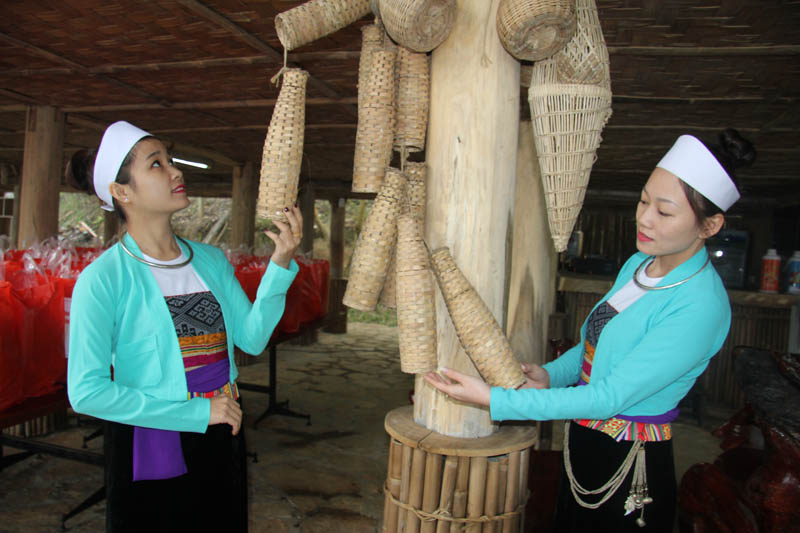
(HBO) – Ngoi village in Ngoi Hoa commune, Tan Lac district, is one of the most beautiful and pristine villages on the bank of Hoa Binh Lake in Hoa Binh province. However, the village is only accessible by boat due to its remote location and unfavourable roads.
Therefore, Ngoi village
remains almost untouched by development impacts. It is home to Muong ethnic
people who mostly earn their living by fishing in
Hoa
Binh
Lake. The traditional beauty of the
Muong ethnics’ stilt houses can be seen here. Local residents from children,
elderly women to young men are friendly and kind, while the sound of the daily
life along with the beauty of the mountain and the forest, the clouds and water
here create an idyllic setting.

The Hoa Binh Tourism joint Stock Company builds seven
community-based tourist houses in Ngoi
village of
Ngoi Hoacommune (Tan Lac district).
The village is located on
the bank of
Ngoi
Hoa
Bay,
which covers thousands of hectares of limpid water of the lake. Rock and earth
islands full of luxuriant vegetation spread across the lake. Standing in the
stilt houses, visitors can feel the wind, see the sunrise, enjoy the moon
reflected in the lake and hear fish wriggling, a picturesque space that cannot
be found anywhere else. On the back of the village is the imposing mountain and
mysterious primitive forest.
The area is also home to a
number of amazing waterfalls and caves, part of the local unspoiled beauties.
Hoa Tien Cavern is a gift of nature at
Hoa
Binh
Lake. The cave is spacious with
stalactites in various shapes, a wonderful destination for nature lovers and
adventurers. Notably, Ngoi village is where a Lung Cu bronze drum was unearthed
in 1993.
The village, dubbed a "Ha
Long Bay on mountains”, is situated in the core area of the development plan of
the
Hoa
Binh
Lakenational tourism area.
Mr. Vu Duy Bong, chairman
of the board of directors of the Hoa Binh Tourism Investment joint Stock
Company, said the firm had conducted a survey to make comprehensive assessment
of Ngoi village’s natural and cultural potential so as to develop
community-based and high-quality tourism products, thus better meeting the need
of domestic and foreign tourists. Ngoi village is a beautiful and tranquil land
with original traditional cultural values preserved through many generations.
Realising the local
potential and tourism development opportunities, the Hoa Binh Tourism joint
Stock Company has invested in this area to make it a natural and cultural
tourism site. Thanks to the company’s countless efforts and coordination with
relevant sectors, authorities and local residents, Ngoi village has become a
community-based tourism village with distinctive identities, attracting more
and more domestic and foreign visitors.
The company recently built
a community-based tourism cluster in Ngoi village with seven standardised stilt
houses, providing steady jobs for tens of local households. It also inaugurated
Vietnam’s biggest floating water park here, which features 34 floating structures
serving water games and sports such as inflatable boat sailing, canoeing,
fishing and raft racing, along with floating pools and restaurants.
Ngoi village is an ideal
location for those who want to go trekking, enjoy themselves in the midst of
the nature, or learn about the culture of Muong ethnics through traditional
singing and rural market activities. It will give visitors peaceful holidays
with poetic landscapes and delicious specialties.
Located just a 20-minute drive from Hoa Binh City, Ora Hill Farmstay & Glamping Hoa Binh is a captivating new destination nestled in Mo hamlet, Bình Thanh commune, Cao Phong district. Combining farming with leisure, this tranquil retreat is perfect for those seeking balance, joy, and an immersive experience in the expansive beauty of nature.
Muong Bi - Tan Lac is renowned as one of the four famous Muong regions in Hoa Binh province. Blessed by nature with a favourable climate and stunning landscapes, Tan Lac holds great advantages for tourism development. The local tourism industry has made remarkable strides in recent times thanks to the attention and support from the local authorities and sectors.
With its strategic location, well-developed transport network, and diverse soil and climatic conditions, Hoa Binh is emerging as a must-visit destination in Vietnam's northwestern tourism corridor. The province boasts numerous attractions, including the Kim Boi hot springs (Kim Boi district), the Dau Rong cave complex (Cao Phong), the Mai Chau valley (Mai Chau), and the iconic Hoa Binh hydropower plant.
The northern mountainous province of Hoa Binh has been listed among the 71 most beautiful places to visit worldwide by the prestigious US travel magazine Condé Nast Traveller.
Hoa Binh province’s rich natural and cultural resources position it as a prime location for developing community-based tourism (CBT). In recent years, support from central and provincial policies, as well as assistance from non-governmental organisations, have encouraged local ethnic minority and mountainous communities to actively engage in the sector.



